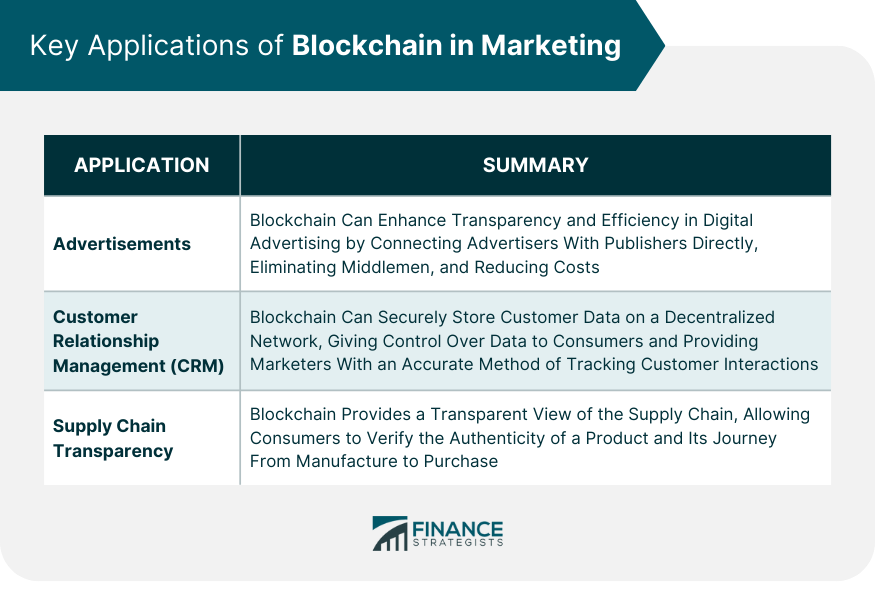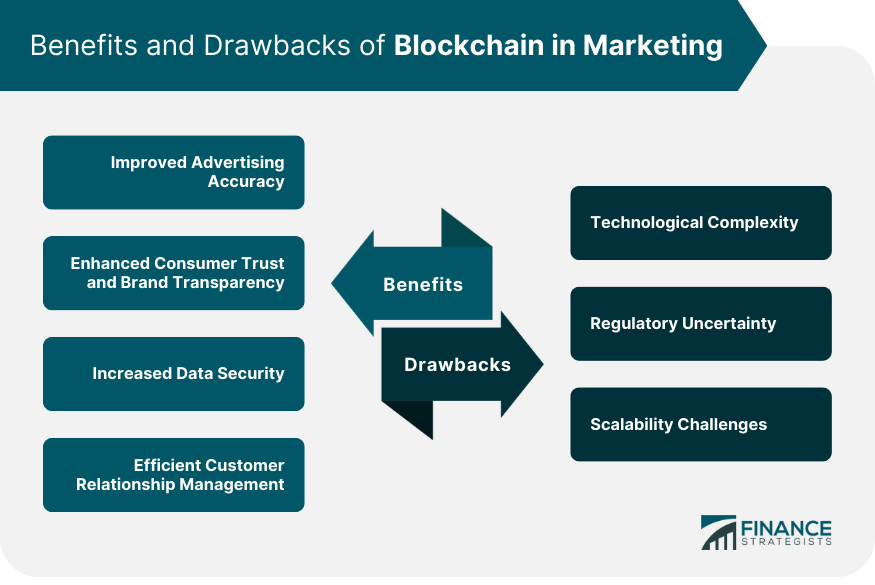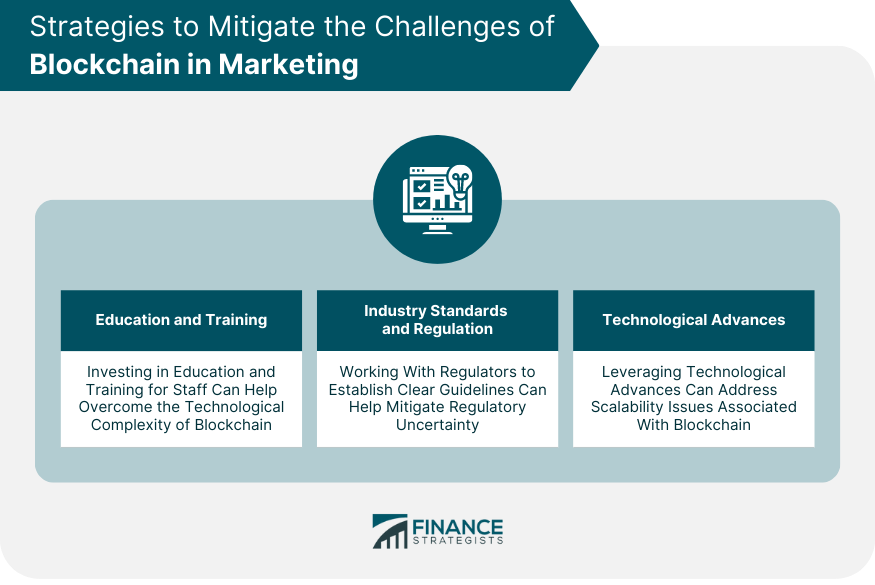Blockchain technology, initially rooted in the digital currency sector, offers significant transformative potential in marketing. Companies can streamline operations, boost customer engagement, and minimize fraud by integrating this decentralized, transparent public ledger into various marketing disciplines, ranging from advertising to customer relationship management. The technology aids in enhancing operational efficiency by eliminating intermediaries in advertising networks, thereby reducing costs and optimizing processes. Furthermore, it fosters a climate of trust by providing transparent insights into a company's operations, including supply chain processes and customer data management. The real revolution that blockchain brings to marketing lies in its ability to reshape how marketers reach their target audience and understand consumer preferences, leading to more finely tuned and effective campaigns. The essence of blockchain lies in the unparalleled transparency and traceability it provides. From a marketing perspective, this means that businesses can monitor the performance of their ads in real time and precisely identify how their marketing budget is being utilized. In addition, it paves the way for transparent tracking of goods along the supply chain, offering consumers valuable insight into the product's journey from production to retail. The intrinsic decentralized nature of the blockchain signifies that no single entity exercises control over the entire network. Such decentralization bolsters security as it removes the vulnerability inherent in centralized systems that are susceptible to a single point of failure. In the marketing domain, this ensures robust protection of customer data and reduces the likelihood of data breaches. Blockchain technology can serve as a major catalyst in enhancing the transparency and efficiency of digital advertising. By leveraging the capabilities of smart contracts, a type of self-executing contract with the terms of the agreement directly written into code, advertisers can establish a direct connection with publishers. This approach eliminates the need for intermediaries, thereby reducing costs and combating ad fraud by guaranteeing that ads reach the intended audience. In the realm of CRM, blockchain can play a pivotal role by securely storing customer data on a decentralized network. This confers control over data to consumers and provides marketers with an accurate method of tracking customer interactions. The outcome is marketing strategies that are well-targeted and effective. From a marketing viewpoint, the blockchain provides a transparent glimpse into the supply chain, enabling consumers to verify the authenticity of a product and understand its journey from manufacture to purchase. Such increased transparency enables companies to establish consumer trust and enhance their brand image. By removing intermediaries in the advertising chain, blockchain technology enables more accurate targeting and measurement of ad campaigns. This not only reduces costs but also drives marketing efforts that are far more effective. The inherent transparency of blockchain technology allows consumers access to detailed information about a product's journey and a company's operations. This level of transparency significantly bolsters consumer trust in a brand. The decentralized characteristic of blockchain technology assures the security of customer data. By distributing data across a network of computers, blockchain dramatically reduces the risk of data breaches and unauthorized access. By securely storing customer data and keeping a detailed record of interactions, blockchain enhances the efficiency of CRM systems. The result is enriched customer insights and marketing strategies that are more accurately targeted. One of the primary obstacles to implementing blockchain in marketing is its technological complexity. To comprehend and implement blockchain technology requires a deep level of technical knowledge, which may be a barrier for some companies. The legal framework surrounding blockchain is still nebulous in many areas. This lack of clarity can pose significant challenges for companies looking to incorporate blockchain into their marketing efforts. Blockchain technology currently grapples with issues related to scalability. As the number of transactions on a blockchain increases, the speed of the network can decrease, posing potential challenges for large-scale applications in marketing. One of the keys to overcoming the technological complexity of blockchain is investing in education and training for staff. This initiative can help unravel the complexities of the technology and streamline its implementation. Working in tandem with regulators to develop clear guidelines and standards can help to mitigate the regulatory uncertainty that surrounds blockchain. This collaborative effort can assist businesses in navigating the intricate regulatory landscape and confidently integrate blockchain into their marketing efforts. To tackle the scalability issues that come hand in hand with blockchain, businesses can leverage technological advances. This could mean adopting newer, more scalable blockchain platforms or integrating off-chain solutions that can process transactions more quickly. Blockchain technology harbors massive potential for reshaping the marketing landscape. By bolstering transparency, enhancing the accuracy of advertising, and bolstering data security, blockchain has the potential to empower businesses to craft more consumer-centric and effective marketing strategies. However, the road to widespread adoption is fraught with challenges. Technological complexity, regulatory ambiguity, and scalability issues remain significant stumbling blocks. Nevertheless, with concerted efforts in education, the establishment of clear regulatory guidelines, and harnessing technological advances, these challenges can be navigated. The future holds exciting possibilities as the exploration and implementation of blockchain continue to redefine the marketing industry, fostering trust, efficiency, and engagement in innovative ways. Embrace the exciting potential of blockchain in the marketing industry by seeking professional wealth management guidance today, navigating the complexities together, and capitalizing on innovative, efficient, and engaging strategies for the future.What Is Blockchain in Marketing?
How Blockchain in Marketing Works
Transparency and Traceability
Decentralization and Security
Key Applications of Blockchain in Marketing
Advertisements
Customer Relationship Management (CRM)
Supply Chain Transparency

Benefits of Blockchain in Marketing
Improved Advertising Accuracy
Enhanced Consumer Trust and Brand Transparency
Increased Data Security
Efficient Customer Relationship Management
Drawbacks of Blockchain in Marketing
Technological Complexity
Regulatory Uncertainty
Scalability Challenges

Strategies to Mitigate the Challenges of Blockchain in Marketing
Education and Training
Industry Standards and Regulation
Technological Advances

The Bottom Line
Blockchain in Marketing FAQs
Blockchain in marketing refers to the use of blockchain technology to streamline marketing operations, increase transparency, and enhance data security.
By eliminating intermediaries, blockchain allows for more precise targeting and measurement of advertising campaigns, thus improving accuracy.
Blockchain technology offers transparent insights into a product's journey and a company's operations, fostering enhanced consumer trust.
Blockchain faces several challenges in marketing, including its technological complexity, regulatory uncertainty, and scalability issues.
Education and training, establishing industry standards and regulations, and leveraging technological advances can help mitigate the challenges of blockchain in marketing.
True Tamplin is a published author, public speaker, CEO of UpDigital, and founder of Finance Strategists.
True is a Certified Educator in Personal Finance (CEPF®), author of The Handy Financial Ratios Guide, a member of the Society for Advancing Business Editing and Writing, contributes to his financial education site, Finance Strategists, and has spoken to various financial communities such as the CFA Institute, as well as university students like his Alma mater, Biola University, where he received a bachelor of science in business and data analytics.
To learn more about True, visit his personal website or view his author profiles on Amazon, Nasdaq and Forbes.











